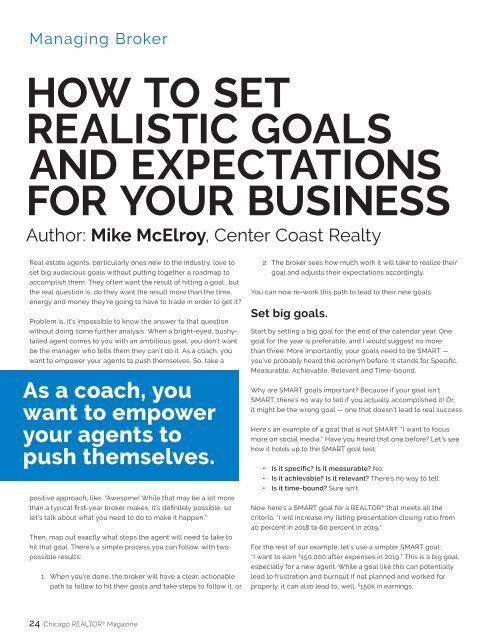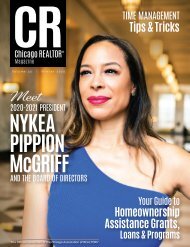CR Magazine – Autumn 2018
The official publication of the Chicago Association of REALTORS®.
The official publication of the Chicago Association of REALTORS®.
You also want an ePaper? Increase the reach of your titles
YUMPU automatically turns print PDFs into web optimized ePapers that Google loves.
Managing Broker<br />
HOW TO SET<br />
REALISTIC GOALS<br />
AND EXPECTATIONS<br />
FOR YOUR BUSINESS<br />
Author: Mike McElroy, Center Coast Realty<br />
Real estate agents, particularly ones new to the industry, love to<br />
set big audacious goals without putting together a roadmap to<br />
accomplish them. They often want the result of hitting a goal...but<br />
the real question is, do they want the result more than the time,<br />
energy and money they’re going to have to trade in order to get it?<br />
Problem is, it’s impossible to know the answer to that question<br />
without doing some further analysis. When a bright-eyed, bushytailed<br />
agent comes to you with an ambitious goal, you don’t want<br />
be the manager who tells them they can’t do it. As a coach, you<br />
want to empower your agents to push themselves. So, take a<br />
As a coach, you<br />
want to empower<br />
your agents to<br />
push themselves.<br />
positive approach, like, “Awesome! While that may be a lot more<br />
than a typical first-year broker makes, it’s definitely possible, so<br />
let’s talk about what you need to do to make it happen.”<br />
Then, map out exactly what steps the agent will need to take to<br />
hit that goal. There’s a simple process you can follow, with two<br />
possible results:<br />
1. When you’re done, the broker will have a clear, actionable<br />
path to follow to hit their goals and take steps to follow it, or<br />
2. The broker sees how much work it will take to realize their<br />
goal and adjusts their expectations accordingly.<br />
You can now re-work this path to lead to their new goals.<br />
Set big goals.<br />
Start by setting a big goal for the end of the calendar year. One<br />
goal for the year is preferable, and I would suggest no more<br />
than three. More importantly, your goals need to be SMART —<br />
you’ve probably heard this acronym before. It stands for Specific,<br />
Measurable, Achievable, Relevant and Time-bound.<br />
Why are SMART goals important? Because if your goal isn’t<br />
SMART, there’s no way to tell if you actually accomplished it! Or,<br />
it might be the wrong goal — one that doesn’t lead to real success.<br />
Here’s an example of a goal that is not SMART: “I want to focus<br />
more on social media.” Have you heard that one before? Let’s see<br />
how it holds up to the SMART goal test:<br />
• Is it specific? Is it measurable? No.<br />
• Is it achievable? Is it relevant? There’s no way to tell.<br />
• Is it time-bound? Sure isn’t.<br />
Now here’s a SMART goal for a REALTOR ® that meets all the<br />
criteria: “I will increase my listing presentation closing ratio from<br />
40 percent in <strong>2018</strong> to 60 percent in 2019.”<br />
For the rest of our example, let’s use a simpler SMART goal:<br />
“I want to earn $ 150,000 after expenses in 2019.” This is a big goal,<br />
especially for a new agent. While a goal like this can potentially<br />
lead to frustration and burnout if not planned and worked for<br />
properly, it can also lead to, well, $ 150k in earnings.<br />
24 Chicago REALTOR ® <strong>Magazine</strong>


















